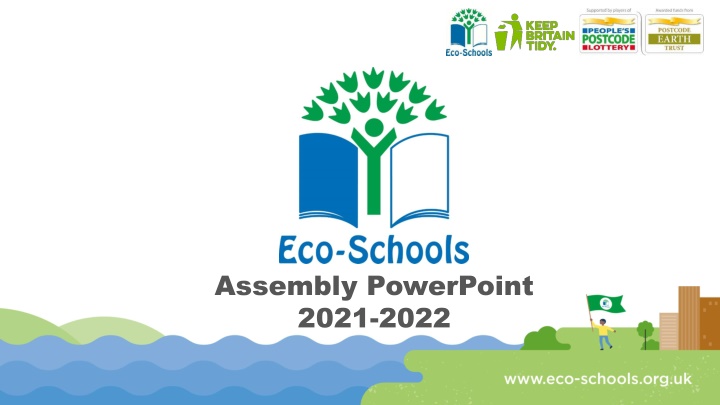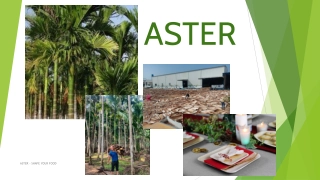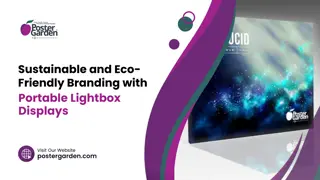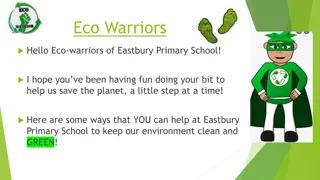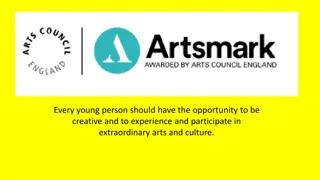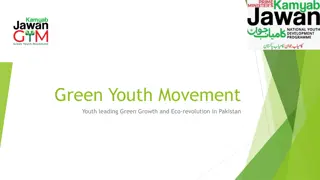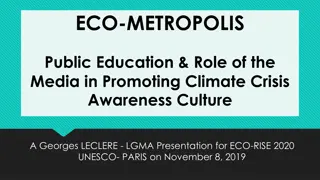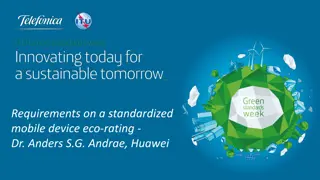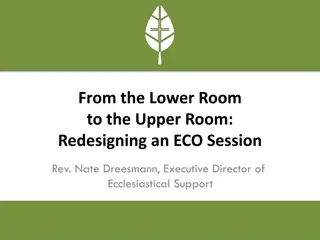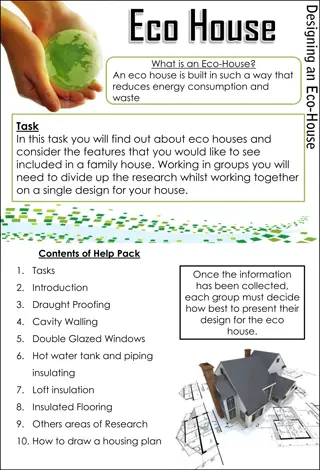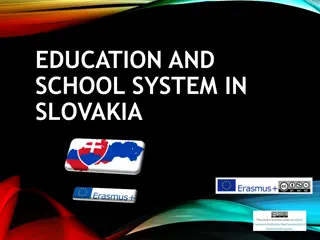Empowering Young People Through Eco-Schools: Seven Steps and Ten Topics
Encouraging young individuals to take environmental action, Eco-Schools provides a comprehensive framework comprising Seven Steps and Ten Topics to address sustainability in schools and communities. By involving youth in initiatives such as forming Eco-Committees, conducting Environmental Reviews, and choosing relevant topics like Biodiversity and Global Citizenship, the program aims to instill a sense of responsibility and empower them to protect the planet. Engaging in eco-projects not only enhances environmental awareness but also fosters creativity, teamwork, and valuable skills essential for a sustainable future.
Download Presentation

Please find below an Image/Link to download the presentation.
The content on the website is provided AS IS for your information and personal use only. It may not be sold, licensed, or shared on other websites without obtaining consent from the author.If you encounter any issues during the download, it is possible that the publisher has removed the file from their server.
You are allowed to download the files provided on this website for personal or commercial use, subject to the condition that they are used lawfully. All files are the property of their respective owners.
The content on the website is provided AS IS for your information and personal use only. It may not be sold, licensed, or shared on other websites without obtaining consent from the author.
E N D
Presentation Transcript
Assembly PowerPoint 2021-2022
What is Eco-Schools? Eco-Schools is Seven Steps designed to put young people like yourselves in control of environmental action in your school, local community and beyond! When you have worked through each of the Eco-Schools Seven Steps you can apply for an Eco-Schools Green Flag Award, this tells the world how awesome our school is at protecting the planet! By the way, Eco-Schools is over 25 years old and schools in 70 countries take part in the programme! Quick Question: Why do you think it is important for young people to be involved in Environmental Action?
Why should young people be involved? Here are some of the reasons Eco-Schools think it is important to involve young people in environmentalism: Young people have fantastic ideas for environmental projects. Environmental action is fun and rewarding. If we want to protect our planet, we need everyone s help. It can help provide young people with confidence and teach them new skills. Young people can make a huge difference. Young people have fantastic ideas for environmental projects. Environmental action is fun. If we want to protect our planet, we need everyone s help. It can help give young people confidence and teach them new skills. Young people can make a huge difference.
The Seven Steps - they usually take a whole school year to work through! Step 1: Eco-Committee, a group of young people and adults, who are responsible for all things Eco-Schools! Step 2: Environmental Review, to help find out what our school is doing well and what could be improved. Step 7: Eco-Code, a whole school promise to keep protecting our planet. Step 6: Monitoring and Evaluation, checking whether the Action Plan is going well and making changes if it isn t! Step 3: Action Plan, when the Eco-Committee decide what topics our school will work on and environmental projects we will complete. Step 5: Informing and Involving, our Eco-Committee will make sure our whole school is involved in protecting our planet. Step 4: Curriculum Links, our teachers will make sure you learn about important eco-issues during lessons. Quick Question: Would any of you like to be on our school s Eco-Committee?
The Ten Topics Whilst working through the Eco-Schools Seven Steps, we are allowed to choose three topics to work on. We may decide to work on topics we scored lowest on in Step 2: Environmental Review, or we might work on topics we are really passionate about it will be up to the Eco-Committee to decide! Biodiversity Caring for all plants, animals and insects. Global Citizenship Working with others on local and global issues. Energy Reducing energy use and investigating greener energy sources. Healthy Living Improving mental and physical wellbeing.
The Ten Topics (continued) Litter Reducing the amount of litter in your local area. Marine Protecting all rivers, canals, lakes and oceans. School Grounds Enhancing where you work and play. Transport Finding more environmentally- friendly ways to travel. Waste Refuse, Reduce, Reuse, Repair, Recycle. Water Protecting an important natural resource. Quick Question: Did anyone notice climate change or the climate crisis isn t a topic? Why do you think this is?
Whats Next? The reason Climate Change or Climate Crisis isn t a topic is because all of the topics relate to climate change in some way for example energy and transport are the biggest emitters of greenhouse gases, biodiversity and water are hugely affected by climate change! First, we will need to recruit an Eco-Committee, who will complete the Environmental Review and create an Action Plan. The whole school will be kept up-to-date on our progress. For now, here is how you can get involved Any Questions?
